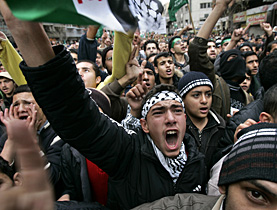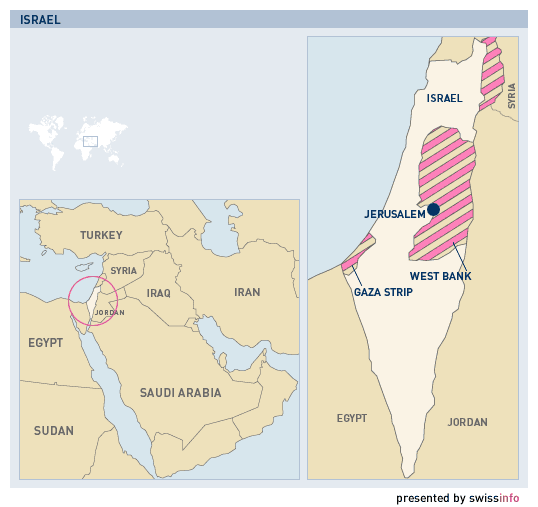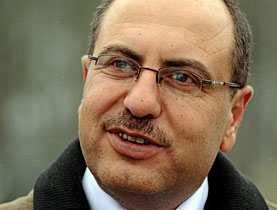Arab anger inflamed by suffering in Gaza

Despite a rising death toll in Gaza, Israel has rejected calls for a truce with Hamas, saying the pressure must remain on the organisation's "military machine".
As Arab foreign ministers meet in Cairo to seek a common position in response to the Israeli attacks, Syrian-based Swiss journalist Karin Wenger tells swissinfo about the public outrage felt across the Arab world.
Hamas said on Wednesday it was prepared to study proposals for a ceasefire that would require Israel to halt attacks and lift “entirely” its blockade.
The current violence erupted after a six-month ceasefire brokered by Egypt expired on December 19 and Hamas intensified rocket attacks from the Israeli-blockaded Gaza Strip.
After five days of air strikes by Israel, Hamas continues to fire rockets, some reaching more than 40 km inside Israel. The threat remains of a possible ground offensive by Israel on the heavily populated territory.
Wenger, who currently lives in Damascus, travels regularly to Gaza and the West Bank and reports on the Middle East for Swiss newspapers.
swissinfo: To what extent do protests taking place against the Israeli air strikes reflect the mood in Arab countries?
Karin Wenger: Here in Syria there have been several protests organised by different groups but it is important to realise that not only the protestors are angry. You hear the same story with anybody you speak to – anger and frustration. Frustration about the non-reaction of the Western world or this whole rhetoric about Israel defending itself.
So it’s not a question of how big the protests are. In fact, everybody feels angered about the whole story.
swissinfo: What is the tone of the coverage of the Israeli bombardment in the Arab media?
K.W.: Of course there is more the Arab angle of the situation and much more about the demonstrations, which are huge in the Arab world. There is a lot of footage from inside Gaza – the destroyed buildings, and many more images of the dead and injured people. We [in Europe] don’t see as many horrific pictures as on Arabic TV but this is part of the story unfortunately.
swissinfo: The anger that Arabs feel, is it only directed at Israel or are they also angry with Hamas?
K.W.: No, I haven’t heard anybody expressing anger at Hamas, the anger is concentrated against Israel and towards the Western countries. There is big support for Hamas among the people, but not in government of course because the governments of Egypt and Syria both try to keep Hamas down.
There is also a lot of anger towards the Egyptians because they haven’t really opened their border with Gaza, just allowed through a few injured and some humanitarian assistance trucks. Egypt is seen as a puppet of America, bowing to American pressure. In Yemen the Egyptian consulate was stormed yesterday.
swissinfo: You spent a week in Gaza just before the Israeli offensive – what was the atmosphere like there?
K.W.: What I could see there was firstly the absolute control by Hamas of the Gaza strip. It is a complete illusion of Israel to think it can eradicate Hamas.
Hamas is ruling the Gaza strip with an iron fist. They have made it crystal clear that anyone opposing Hamas will be punished. For example the aid that is going to Hamas is given to Hamas supporters.
I could also feel a lot of fear among the population. In general there is still big support for Hamas but partly because there is no alternative in the Gaza Strip to Hamas.
swissinfo: What are the prospects of a new Hamas ceasefire, possibly brokered by the Egyptians?
K.W.: The Egyptians already mediated the last ceasefire and they planned to have a continuation of that ceasefire but this didn’t happen. Now they have to start from the beginning with new negotiations.
In the end there has to be a ceasefire. Israel will not be able to stop the rocket attacks through a big military invasion. These rockets are far too small to eliminate them all.
From the point of view of Hamas, they felt they did not gain anything from their six-month ceasefire. The borders did not open and humanitarian aid decreased instead of increasing. They will only agree to a new ceasefire now if they get something in exchange for it, like an agreement for the border to be opened, at least at Rafah, to allow people to cross and goods to come in.
Medical officials in Gaza on Wednesday said 385 Palestinians have been killed and more than 800 wounded since the Israeli offensive began on December 27. A United Nations agency said at least 25 per cent of those killed were civilians.
In the same period four Israelis have been killed by rockets fired from within Gaza, some of which have reached as far as 40 km inside Israel.
In Gaza, basic food supplies are running low and power cuts affect much of the territory. Hospitals are overwhelmed by the high number of casualties from the offensive.
Israel population: 7.1 million
1.6 million are Arabs with Israeli citizenship
Size: 20,770 square kilometres, about half the size of Switzerland


In compliance with the JTI standards
More: SWI swissinfo.ch certified by the Journalism Trust Initiative












You can find an overview of ongoing debates with our journalists here . Please join us!
If you want to start a conversation about a topic raised in this article or want to report factual errors, email us at english@swissinfo.ch.